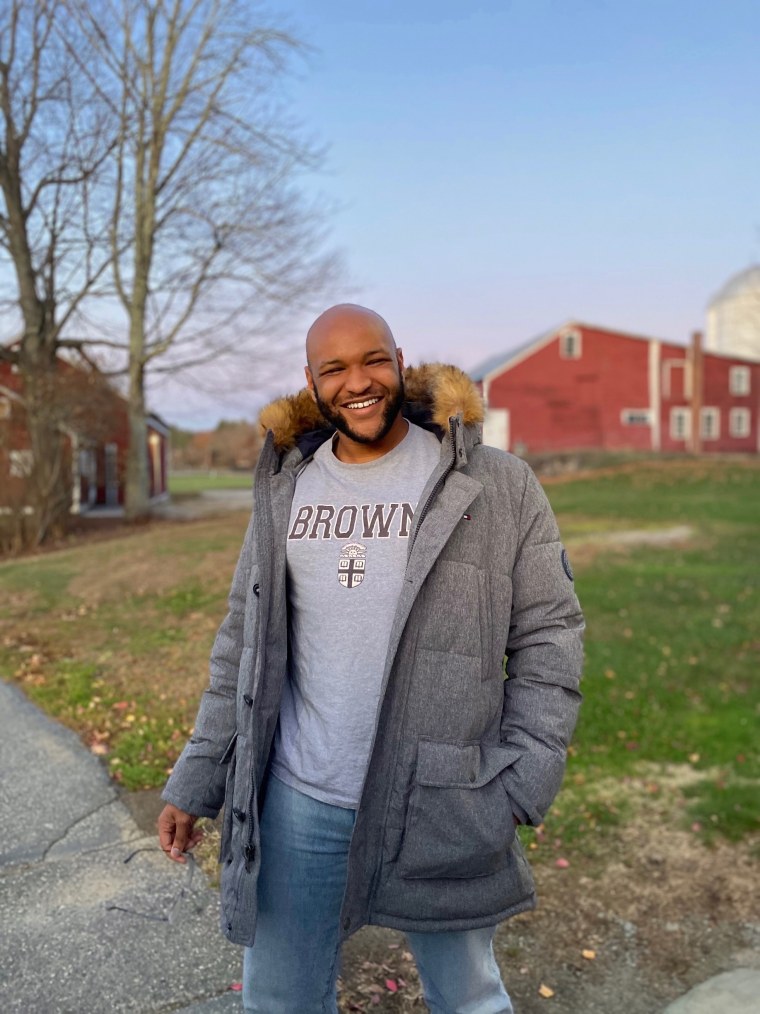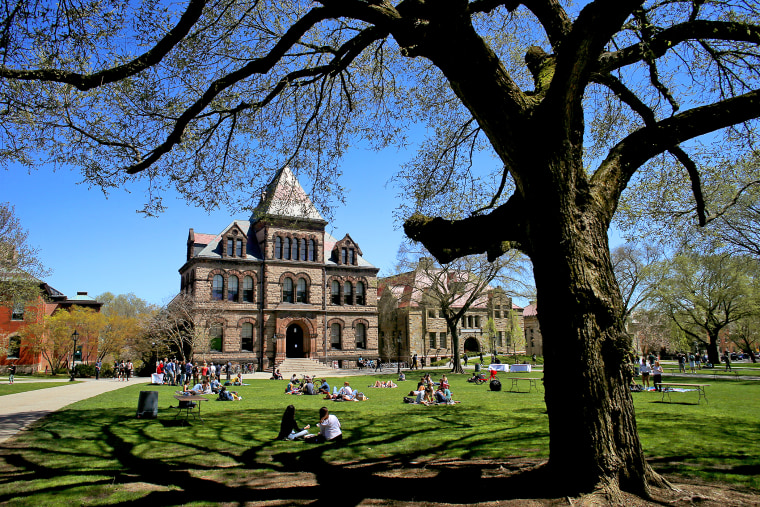Undergraduate students at Brown University in Providence, Rhode Island, voted last week for the Ivy League school to offer reparations to the descendants of enslaved people who labored on campus.
“The murder of George Floyd influenced everything,” Jason Carroll, the student body president who organized the vote, said. “His passing, as well as the Black Lives Matter movement’s resurgence over this past summer, rocketed Black issues into the mainstream in a way where it really wasn't before.”
Carroll, who is a descendant of enslaved people, said he’s grown tired of “liberal institutions like Brown publicly professing their ideals to address racial harm and justice. This institution is built off of racial harm and injustice, and there's really not been much done about that.”
“We treat our main green as this beautiful park,” he said. “People walk their dogs, they play frisbee, they do homework there. And they're sitting and lounging on the places where slaves literally stood. And there's these untold horrors that exist right where we lay around really just ignorant of that.”
Brown released a report in 2006 detailing the history of enslavement of its campus. Action steps The action taken following the report includes erecting a slavery memorial and establishing centers committed to doing more research. But students say the next step is reparations.
What students at Brown want reparations to look like
Carroll, a senior studying political science, said any reparation plans have to start with Brown seeking living descendants.
“That hasn't been done and that's an important step I don't want us to skip,” he said. “If the university finds specific people whose ancestry traces directly back to the university and Brown family slavery, then that is a conversation about preferential admissions, direct reparations, direct scholarships.”
Brian Clark, a Brown spokesperson, said in a statement that the university has not made any efforts to identify descendants.
Carroll said this process can happen with the help of construction records for University Hall that “have exact names of whose ‘Negroes’ were donated to the university for periods of time to work on the building.”

While these efforts are underway, Brown should increase investments in local Black communities, he said. The proposal posed to students in the annual election said reparations could be in the form of preferential admission, direct payments and targeted investments, among other actions.
Youma Traore, a senior majoring in Africana studies and public policy who voted for reparations, said a starting point for community efforts is Brown investing in the local community. The university, she said, could invest more in local public schools with large minority populations, just as it does with a local private school that is predominantly white.
“It’s Brown’s responsibility, and also the responsibility of students, to hold each other up and be in solidarity and ensure that they’re getting what’s due to them,” said Traore, who is Malian.
Morgan Brinker, a senior premedical student, voted in favor of reparations and said efforts must be sustainable beyond the current momentum fueling it: “I don't want this to be a quick one and done thing, which I think sometimes Brown defaults to,” adding that any reparation model should be designed to last for as long as Brown remains.
Brinker said a starting point is hiring more Black faculty: “I have not had a Black professor in STEM,” she said, referring to science, technology, engineering and math. “There should be more representation. I run a group for students who are underrepresented in STEM and we're trying to find faculty sponsors. We just could not find enough people of color in general but especially Black people.”
Brinker, who is a descendant of enslaved people, said Brown should enroll more Black students and that the percentage of Black professors and students should, at a minimum, equal the percentage of Black people in the U.S., 13 percent.
Black students are just 6 percent of Brown’s student body and faculty appointments respectively.
Brown's history with slavery
Brown owned up to its role in the business of slavery long before the current social justice push.
In 2006, Brown became the first university to publish a report detailing its ties to slavery. The report found that funds from its direct and indirect involvement are the original source of the university’s nearly $5 billion endowment and most of its assets. The school’s first president, James Manning, “arrived in Rhode Island accompanied by a personal slave.” Thirty members of the Brown Corporation owned or captained slave ships while in their positions and University Hall, the oldest building on campus, was constructed by enslaved people, according to the report.
Four brothers founded the university and each of them were slave masters to at least 14 people total, the report said. They funded or participated in several voyages to Africa to make purchases and one of the Brown family’s commissioned ships “acquired a cargo of 196 Africans,” of whom at least 20 died during the journey to Rhode Island, the report said. The report detailed in gruesome detail the treatment endured by the enslaved people.
Since the report, Brown has established centers dedicated to further study. It also erected a memorial in a central part of its campus, which publicly states how it benefited from the business of slavery. In the past year, Brown has formed a task force on anti-Black racism to study instances of institutional racism on campus.
The report does not recommend reparations. Ruth Simmons, the president at the time who formed the committee that produced the report, said in a 2004 letter that "the committee's work is not about whether or how we should pay reparations. That was never the intent nor will the payment of reparations be the outcome."
Clark, the spokesperson for Brown, did not directly comment on the possibility of reparations at the university. But he did say the task force recommends what more Brown can do to address the legacy of slavery.
Religious studies professor Andre Willis co-chairs the task force and said considering reparations is not within its purview: “Our work is to study the various areas on campus to see where instances of anti-Black racism might be existing and then recommend what might be done to rectify those situations. We never had any motivation to pursue something like reparations. That wasn’t on our agenda.”
Willis said task force recommendations are confidential.
He also said he will always support student activism.
“One of the things we've learned in our work on the task force is that students have been responsible for important and significant changes at Brown in ways that I just hadn’t known about,” Willis said. “So I think student activism is really important for this university to progress.”
Traore said as much as students take pride in their activism, it’s also a burden as the heavy lifting often falls on Black students, some of whom are low-income, despite the university’s resources.
“We’re lucky that we do have a strong community at Brown who’s very passionate about equity, holding each other accountable, creating new initiatives that will benefit people in the long run,” she said. “But there’s just always that fear that once you leave, will there be anybody else who will keep this up. Will Brown just throw it to the side?”
CORRECTION (April 2, 2021, 6:10 p.m. ET): A previous version of this article misstated the last name of a student. She is Youma Traore, not Praore.

